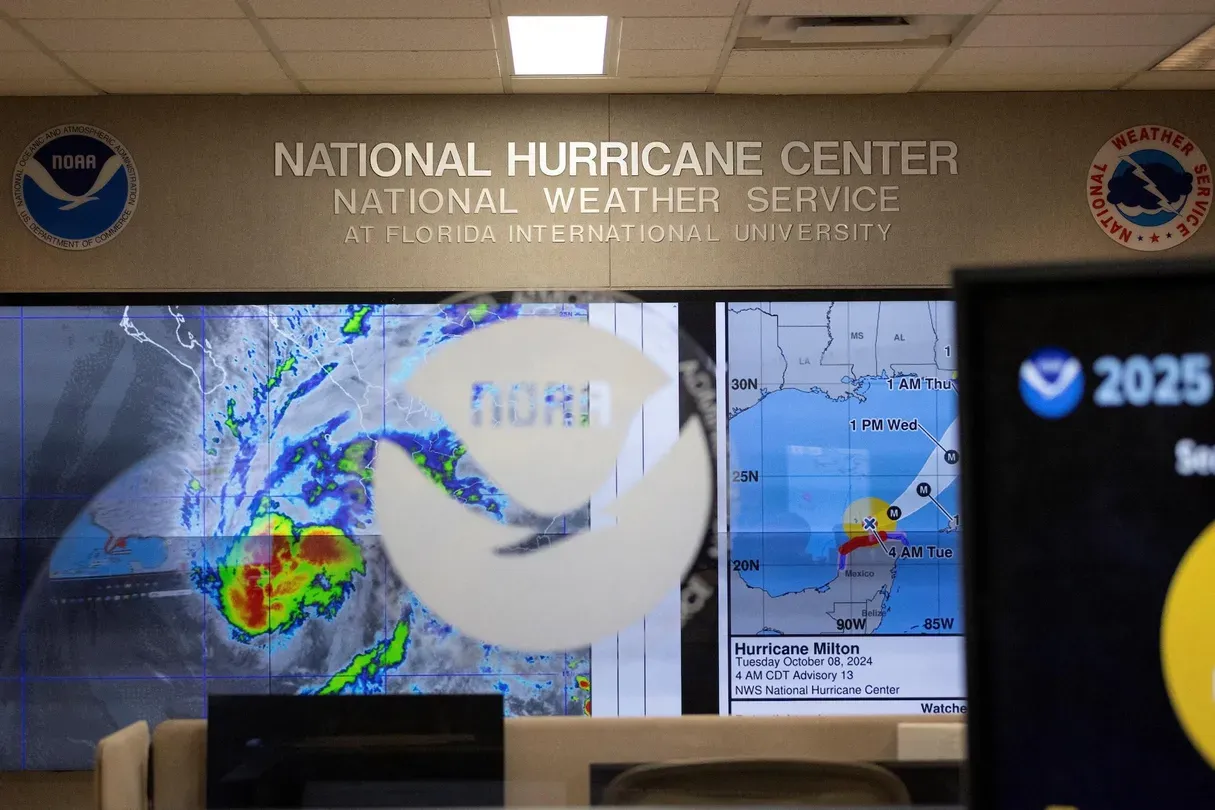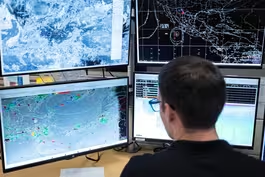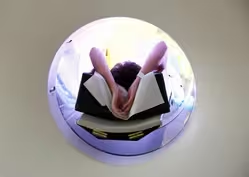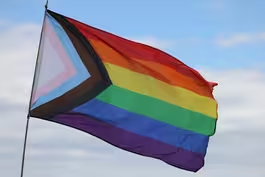

June 1, 2025 - PBS News Weekend full episode
6/1/2025 | 24m 9sVideo has Closed Captions
June 1, 2025 - PBS News Weekend full episode
June 1, 2025 - PBS News Weekend full episode
Problems playing video? | Closed Captioning Feedback
Problems playing video? | Closed Captioning Feedback
Major corporate funding for the PBS News Hour is provided by BDO, BNSF, Consumer Cellular, American Cruise Lines, and Raymond James. Funding for the PBS NewsHour Weekend is provided by...

June 1, 2025 - PBS News Weekend full episode
6/1/2025 | 24m 9sVideo has Closed Captions
June 1, 2025 - PBS News Weekend full episode
Problems playing video? | Closed Captioning Feedback
How to Watch PBS News Hour
PBS News Hour is available to stream on pbs.org and the free PBS App, available on iPhone, Apple TV, Android TV, Android smartphones, Amazon Fire TV, Amazon Fire Tablet, Roku, Samsung Smart TV, and Vizio.
Providing Support for PBS.org
Learn Moreabout PBS online sponsorshipJOHN YANG: Tonight on PBS News Weekend, on the first day of the Atlantic hurricane season, we look at the staff cuts, turmoil and low morale at the federal agencies that forecast, track and respond to storms.
Then, a new study says the risk of cancer from CT scans may be higher than previously known.
And World Pride celebrations underway in the nation's capital in the shadow of Trump administration policies targeting the community.
WOMAN: The Trump administration wants us to disappear and really showing up for World Pride is a direct no to that request.
(BREAK) JOHN YANG: Good evening.
I'm John Yang.
Today marks the official start of what NOAA forecasters predict will be an above normal Atlantic hurricane season.
As many as 19 named storms through November, which is when the season ends, with up to 10 of them forecast to become hurricanes, three to five of them major hurricanes.
But big staffing cuts at NOAA and female are raising question about the federal government's ability to forecast and track these storms as they head for landfall and to lead cleanup and recovery efforts in their aftermath.
Leah Douglas is the agriculture and energy policy reporter at Reuters.
Leah, the folks you talk to as you report on these agencies, what are their concerns?
What do they say they're concerned about this hurricane season?
LEAH DOUGLAS, Reporter, Reuters: Well, typically in the spring leading up to hurricane season, FEMA is very involved in going into the communities that are storm prone and potentially expecting hurricanes and training the state and local emergency managers to prepare and building relationships so that when a storm does come, everyone can work together on the response.
That type of activity has been really curtailed this year as FEMA staff are under speaking and travel restrictions that have led to major parebacks in those types of workshops and trainings.
And so, even just that aspect does reduce the ability of the agency to communicate with the folks on the ground.
And there's concern about how that will play out in hurricane season.
JOHN YANG: Now Homeland Security Secretary Kristi Noem has said that FEMA is being eliminated.
She said, you know, we're eliminating FEMA.
But NBC News reports that she decided to keep about 2,500 core workers who are set to leave.
She wants to keep them through the hurricane season.
How important are these folks to what they do during hurricane season?
LEAH DOUGLAS: Well, the vast majority of FEMA staff are these type of reservists who respond in case of an emergency.
So FEMA has lost about 2,000, a third of their full time staff and will be relying on those types of reservists to respond in case of an emergency.
There's been a lot of turmoil at the agency as President Donald Trump's administration has said that his intention is to shrink or eliminate FEMA and to move some more of the agency's role to the states.
And state officials are concerned about their capacity to take on that role as well.
JOHN YANG: You talk about the turmoil there was in May.
There was a flurry of departures at the executive level.
Why sort of this mass departure and what's that done to their operations?
LEAH DOUGLAS: Staff at FEMA are definitely concerned, according to our reporting, about this type of leadership upheaval.
We saw a presentation that was given to acting head David Richardson that did say that there's morale issues.
We've heard from staff that there is confusion.
What will their role be?
Will they keep their current job?
And so those types of leadership departures are causing a lot of uncertainty, particularly going into this acute disaster season.
JOHN YANG: Now, there have also been staff cuts at the national weather service under NOAA.
What are the implications there for hurricane season?
LEAH DOUGLAS: NOAA.
Yeah, NOAA has lost about 900 employees, which is 7 percent of its staff, doing all types of different activities, one of which is through the National Weather Service.
And there are experts have told us that there are concerns about both the agency's ability to predict and respond to weather activity, but also to coordinate across agencies with FEMA.
For instance, at this week's hurricane press conference about the hurricane outlook, there was not a FEMA official present.
And a prior FEMA administrator told a colleague of mine at Reuters that's very uncommon.
Typically, the agency would want to show close collaboration and that everyone's working together to get ready JOHN YANG: That collaboration is that to -- so you plan where it's going to hit and they can help plan recovery efforts?
LEAH DOUGLAS: Sure.
And to make sure that the agencies understand what the capacity is and just to show that, you know, the different parts of the government are operating and working together.
FEMA has told us that they are prepared for this year's hurricane season and that they have adequate staff resources to respond.
JOHN YANG: Leah Douglas of Reuters, thank you very much.
LEAH DOUGLAS: Thanks for having me.
JOHN YANG: In tonight's other news, in Gaza, officials there say more than 20 Palestinians were killed and over 150 injured as they went to get food.
But there's a dispute over who did the shooting.
The Israeli military denied that their forces were involved and blamed masked gunmen.
But multiple witnesses said they saw Israeli forces firing on crowds near the aid site.
Relatives of the victims gathered at a nearby hospital.
MAN (through translator): He went to get his livelihood.
He left home at 11 o' clock, sleeping near there.
He went to get his food.
They shot him.
He was not carrying weapons or knives or anything.
He went to get food for his children.
He has eight family members.
WOMAN (voice-over): Hunger killed people.
All people are hungry.
Not just one person.
We are all hungry.
None of the houses has flour.
They told us to go get food.
Why are they killing us?
Why?
Why are they killing innocent people?
Isn't it unfair?
JOHN YANG: The aid side is a new one, part of Israel's controversial overhaul of distribution in Gaza.
Intended to prevent looting by Hamas.
The plan replaced the United nations and international groups a with smaller number of sites run by largely U.S. security contractors.
After a two month Israeli blockade, huge crowds of Gazans desperate for food have flocked to the new sites.
The foundation running the site said the distribution went smoothly and accused Hamas of fabricating fake reports.
Ukrainian Air Force said today's Russian drone attack was the largest of the war, and they said a missile attack on a military training facility killed 12 Ukrainian soldiers and wounded 60 others.
At the same time, Ukraine launched drone attacks on Russian military planes deep inside Russia, seen in this video obtained by Reuters.
Russia has stepped up its drone strikes in recent days while demanding that Ukraine negotiate on President Vladimir Putin's terms.
Ukrainian President Volodymyr Zelenskyy said today he'll send a delegation to Istanbul on Monday for a new round of direct talks with Russia.
In today's Polish presidential runoff election, voters are choosing between two candidates for representing starkly different paths forward.
Warsaw Mayor Rafal Trzaskowski is a liberal pro-European.
He's promised to restore judicial independence, ease abortion restrictions and foster ties with European partners.
Karol Nawrocki is a conservative historian backed by the right-wing Law and Justice Party.
He's skeptical of the European Union and is backed by prominent allies of President Trump.
An exit poll tonight shows the race too close to call.
Final results are expected tomorrow.
Paris is celebrating a home team victory in Europe's biggest soccer tournament.
Tens of thousands of fans line the Champs Elysees to welcome home Paris Saint-Germain's players.
The team beat Inter Milan 5 nil on Saturday to win their first title.
It's the biggest winning margin ever in a Champions League final.
The nationwide celebrations have been marred by violence.
Two fans died and a police officer is in a coma.
And the next two nights offer a chance for many Americans to see the northern lights.
The Space Weather Prediction Center says a severe geomagnetic storm hitting Earth overnight tonight has the potential of making the northern lights visible as far south as Alabama and northern California.
But it could also disrupt electronic devices.
The solar storm isn't expected to be as strong as the one that hit Earth last year.
That one sets skies aglow around the world.
Another, smaller storm is expected on Monday or Tuesday.
Still to come on PBS News Weekend, the connection between radiation from CT scans and the risk of developing cancer and world pride celebrations in the nation's capital bring a mix of joy and anxiety.
(BREAK) JOHN YANG: CT scans are quick, painless, noninvasive tests that can identify everything from brain tumors to injuries from an accident.
Now, a new study published in the journal JAMA Internal Medicine shows a link between the radiation exposure from the imaging tool and cancer.
The research projects that the 93 million CT scans performed in 2023 would result in nearly 103,000 future cancer cases.
Ali Rogin spoke to Dr. Rebecca Smith-Bindman.
She's a professor at the University of California, San Francisco, and the study's lead.
ALI ROGIN: Author, Dr. Smith-Bindman, thank you so much for joining us.
First of all, many of us are familiar with CT scans, but let's just establish first, what are they used for and how do they work?
DR. REBECCA SMITH-BINDMAN, University of California, San Francisco: So computer tomography scans are really an essential and frequently used tool in modern medicine.
And basically they're obtaining X rays in a very detailed way around your body to get detailed information about all different organs.
And they're used across almost every area of diagnosis, be it for cancer or trauma or chronic diseases.
It's really a very important.
ALI ROGIN: And with that said, what did your study find?
REBECCA SMITH-BINDMAN: Well, I started by saying CT scanning is really important, but the use of CT scanning continues to rise, and particularly for scans that really don't have clear clinical justification.
And one of the risks for CT scanning is that it exposes patients to ionizing radiation, and that's known to increase the risk of cancer.
So our study aimed to quantify how many future cancers could result from CT scans used in 2023.
So we basically used accurate information about who's getting scans, what kind of scans, what the doses are for those scans.
That's a really important part of the cancer projections.
And we estimate that CTs performed in 2023 will result in approximately 103,000 future cancers in the U.S. population.
And that, if you put that into context, will end up being about 5 percent of cancer in the United States resulting from CT scans if we continue to use the same number of and the doses continue.
ALI ROGIN: So why is it that doctors have been relying more on CT scans in recent years than they did in the past.
REBECCA SMITH-BINDMAN: First, it's a really easy test to perform, and it's available basically 24 7, almost anywhere in the country.
So it's readily available.
It gives you information very quickly.
You know, some scans take much longer.
CT scans are really fast.
Scanning with CT has gone up dramatically over the last few years.
And part of that, I think, is because physicians have become so busy and the time with patients so limited.
Sometimes patients have a CT scan before they even see the healthcare provider.
That's a way to sort of enhance that visit.
I also think that patients really ask for scans a lot.
There's the perception that CT scanning is harmless.
So let's get a test, and then I'll really find out what's going on without appreciating that there's this potential harm.
ALI ROGIN: You yourself are steeped in radiology.
What are the criteria that you employ to figure out whether a CT scan is really necessary or there are alternatives available?
REBECCA SMITH-BINDMAN: So I think the truth is that we sort of started to use CT scanning without really following any criteria.
So we have criteria that should guide the use of imaging, and we don't always follow them, like for pulmonary embolism testing, like for trauma in children, do they need a head CT. And those guidelines don't tend to be followed.
So we need better guidelines, but we also need greater consensus among physicians that it's important to follow those guidelines and not use unnecessary scans.
ALI ROGIN: I want to ask you two questions that I think people watching this who maybe have recently had a CT scan or are potentially facing one in the future might be thinking about.
First of all, if someone's had a CT scan recently, should they be worried?
How would you address those concerns?
And then also, if somebody is going to the doctor and they say, we want you to have a CT scan, what are some things a patient might say or ask that are appropriate in that situation if they have concerns?
REBECCA SMITH-BINDMAN: In terms of patients being concerned about their risk of cancer?
For an individual patient, the risk of getting cancer from the CT scan is very low, one in a thousand or that kind of magnitude.
It's just that we do so many of these (inaudible) that those risks add up and that's what contributes to the cancer at the population level.
So there's nothing you can do about path risk.
You can try to reduce your use of scanning going forward, which is a great segue to your next question.
So partly I advise patients to talk to your doctor about what the benefits and risks are of the scan.
Is it likely to change their management even if they find something?
One of the reasons we do scanning is just to see what's going on.
Patient has a known disease, inactive or not particularly changing, getting scans for that indication doesn't usually help change the course of that person's disease.
And so talk to your doctor about, is this scan likely to help me?
And you want to ask your physicians to please use a scan type that uses less radiation dose, so not to do something called multiple phase scanning, where you're scanning the body multiple times, if that can be avoided.
And when the patient goes to actually get the scan to ask the technologist the same question, can you do that scan with lower dose?
And we want physicians to really start to standardize that practice more than they have done thus far.
ALI ROGIN: Dr. Rebecca Smith-Bindman with the University of California, San Francisco.
Thank you so much.
REBECCA SMITH-BINDMAN: Thanks so much for the invitation.
JOHN YANG: WorldPride, the international LGBTQ plus celebration is underway in Washington, D.C. against the backdrop of the Trump administration rolling back LGBTQ rights and protections, particularly for transgender people.
The co-creator of the ACLU's Freedom to Be campaign, which advocates for trans people's rights, says that makes the event all the more significant.
GILLIAN BRANSTETTER, "Freedom To BE," ACLU: There is nothing that Donald Trump has done or can do to LGBT people that we have not faced before.
We have to show up for one another and show that, no, the power actually lives with us, the people.
And if, you know, he wants us sitting in our home, scrolling on our phones, terrified of what will come next, I think what's important for us to do is remember that courage is contagious.
JOHN YANG: But President Trump's anti DEI policies have led some corporate sponsors to drop out, and some foreign transgender groups have canceled their participation.
June Crenshaw is the deputy director of the Capitol Pride alliance.
The Washington D.C. Group hosting World Pride.
June, when Washington was selected to be the host city for World Pride.
As I understand it, the idea was to it'll be a celebration of the 50th anniversary of D.C.
Pride.
The Washington D.C.
Pride event with what's happened with the second Trump administration has the emphasis and maybe the tone changed.
JUNE CRENSHAW, Capital Pride Alliance: We certainly expected for WorldPride to be a different celebration.
And since the Trump administration, we've had to pivot and really go back to our roots when prides were protests and to really shift to an advocacy type of approach, but not forgetting the fact that we needed to build unity and community and also experience joy.
We weren't prepared for the swiftness of these real horrific actions towards members of our community and really are having to adjust to the new circumstances.
And again, Washington, D.C. is a perfect place for this because it's a place where resistance occurs, activism occurs, but also progress.
JOHN YANG: Some people who are planning to come from foreign countries, sort of outsiders looking in, have expressed concern about personal safety, particularly transgender people.
Three European nations have issued travel advisories.
The Canadian LGBTQ rights group Eagle Canada cancelled its particular participation.
We have a bit of tape here from a member of Toronto's Club for Trans and Binary Swimmers.
Let's take a listen.
RY SHISSLER, Toronto's Purple Fins: Can my team's rights be respective?
Are we going to be arrested just for existing?
Are we going to be assaulted and have the authorities defend us instead of the attacker?
Those are all questions we couldn't definitively say yes to.
So we had to say no, we can't come.
JOHN YANG: What do you say to people who have those feelings?
JUNE CREWNSHAW: Those are really legitimate concerns and we certainly don't want to minimize anyone's safety.
We are asking individuals to consider their safety and their entire circumstances when making a decision to attend.
But for those members of our community that can show up, we're asking you to show up.
It is so important for us to have unity and visibility and resistance in this moment.
The Trump administration wants us to disappear.
And really showing up for WorldPride is a direct no to that request.
ALI ROGIN: A number of longtime corporate sponsors have pulled out, citing the administration's orders on DEI.
Booz Allen Hamilton, Deloitte, Comcast have you been affected by that?
JUNE CRENSHAW: We've been impacted by that just as many prides across the nation and even globally.
I would say that we've seen probably a 20 percent reduction in our corporate sponsors than years pass and it's hard to tell the most vulnerable members of our community to be visible, to resist when corporations that have resources and power are not finding avenues to do that.
So it's disappointing, but it sets us back to our roots of, you know, really looking to the community and not brands to advocate for us.
There have been many organizations that have continued to support and to stand with us and we have a long memory of who those individuals are.
JOHN YANG: To be sure, there are celebratory events.
There will be a parade, there'll be a street festival.
What's the overall message you hope comes out of this event?
JUNE CRENSHAW: That we are a strong, resilient group, that we've navigated this before, that there's opportunities for us, you know, again, to show unity, to come together, to develop an agenda of fighting back, that there should be strategies around protecting the most vulnerable members of our community that are losing rights, the ability to serve in the military and a whole sundry of other things that are happening.
We are here.
We're not going anywhere.
And we need to come together and fight back all the horrific laws and the ways in which our community is being targeted.
JOHN YANG: June Crenshaw, thank you very much.
JUNE CRENSHAW: Thank you.
JOHN YANG: And that is PBS News Weekend for this Sunday.
I'm John Yang.
For all of my colleagues, thanks for joining us.
Have a good week.
As hurricane season begins, federal agencies face challenges
Video has Closed Captions
Clip: 6/1/2025 | 4m 3s | As hurricane season begins, federal agencies overseeing storms face barrage of challenges (4m 3s)
Study shows link between CT scans, risk of developing cancer
Video has Closed Captions
Clip: 6/1/2025 | 6m 12s | Study shows link between CT scans and the risk of developing cancer (6m 12s)
World Pride celebrations bring mix of joy and anxiety
Video has Closed Captions
Clip: 6/1/2025 | 6m 23s | World Pride celebrations in nation’s capital bring mix of joy and anxiety (6m 23s)
Providing Support for PBS.org
Learn Moreabout PBS online sponsorshipSupport for PBS provided by:
Major corporate funding for the PBS News Hour is provided by BDO, BNSF, Consumer Cellular, American Cruise Lines, and Raymond James. Funding for the PBS NewsHour Weekend is provided by...














